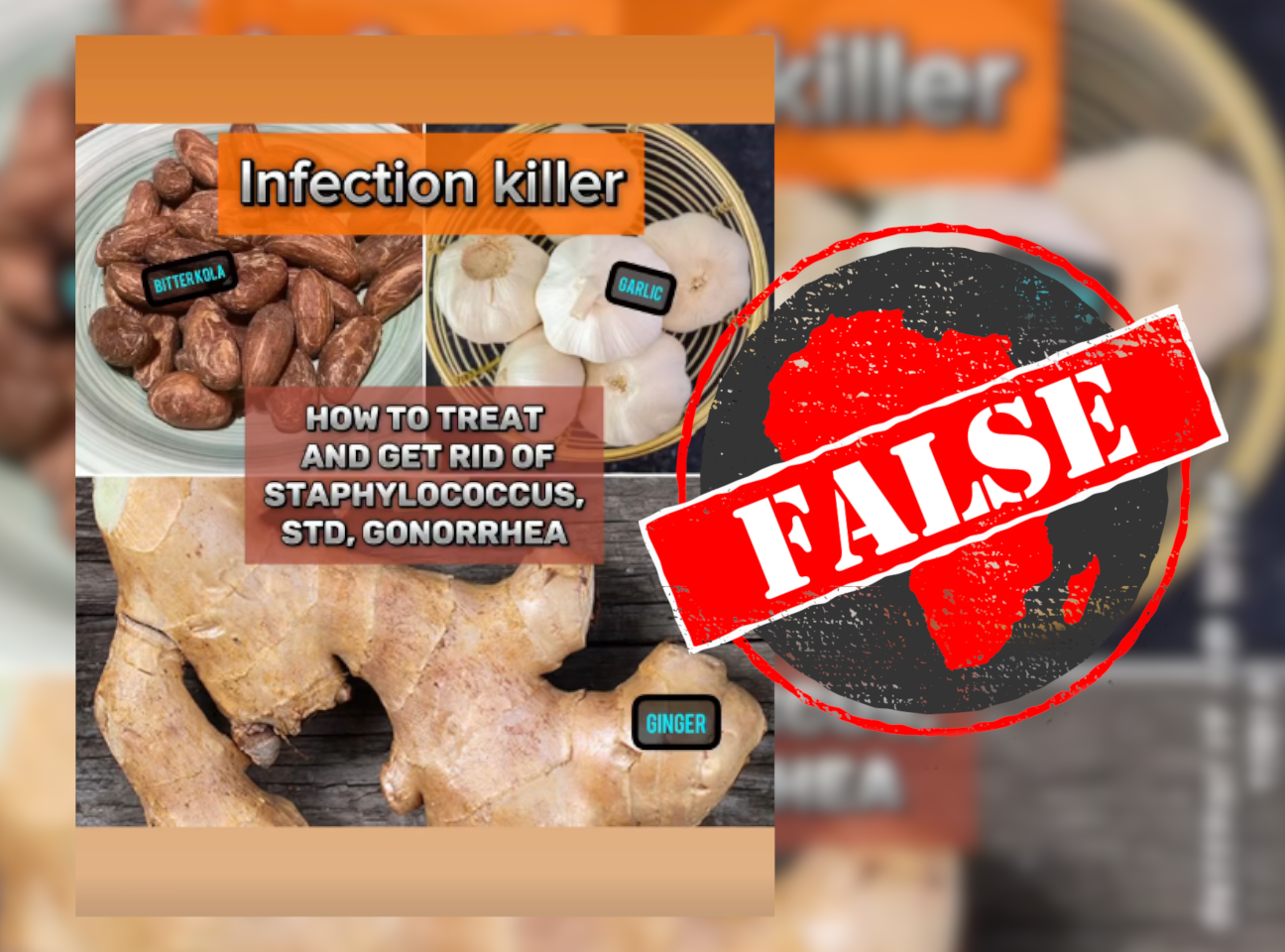IN SHORT: Although these plant ingredients might relieve some symptoms of STIs, the only proven cure is antibiotics. And since these infections might not cause any symptoms, or have symptoms that disappear, experts recommend getting tested and getting treatment early.
According to a video circulating on social media in October 2023, there is an easy home remedy for some common sexually transmitted infections (STIs).
The video claims that a mixture of bitter kola, garlic and ginger will “eliminate” gonorrhoea, syphilis and chlamydia. The video suggests grinding the ingredients into a powder, combining it with lime juice, and drinking the mixture twice a day for a week.
One post showing the video received 5,700 likes on Facebook, while another was even more popular on TikTok with 1,6 million views. The same claim was shared on Facebook in another video here and a post here. We looked into using this herbal remedy to cure these STIs and here’s what we found.

Common STIs caused by bacteria
STIs are conditions that are usually passed from one person to another through sexual activities. There are many different viruses, bacteria and fungi that can cause STIs. Some of these infections are curable with simple antibiotic treatment, but others can cause complications resulting in serious illness or death.
The infections mentioned in the video – gonorrhoea, syphilis, and chlamydia – are some of the most common STIs, according to the World Health Organization (WHO). The health organisation estimates that in 2020 alone, there were 129 million new chlamydia infections, 82 million new gonorrhoea infections and 7.1 million new syphilis infections.
These three infections are all caused by bacteria, and can generally be cured with antibiotics. Antibiotics are medicines that either kill the bacteria that is causing the infection, or stop it from growing and spreading.
Herbal remedies and STIs
Health experts don’t recommend using herbal remedies for these infections. Although some remedies may temporarily help with symptoms, they will not kill the bacteria that cause the infection.
For example, garlic and bitter kola have anti-inflammatory or antibacterial properties that might relieve some symptoms. Ginger is also being studied for its potential to fight some bacteria. But this doesn’t mean these foods can cure these specific infections, which require strong antibiotics to target the bacteria that causes them. There is no evidence that these ingredients can cure these common STIs.
Although generally safe, the ingredients in this home remedy could cause side effects in large amounts. Experts warn that garlic, especially when consumed raw, can lead to upset stomach and heartburn. The same is true for ginger, which can also cause diarrhoea and mouth irritation. Since bitter kola has stimulant properties, it may be dangerous for people with heart conditions or high blood pressure.
Chlamydia
This common STI is often present without any signs, so many people are unaware that they are infected. But some people do have symptoms, like a burning feeling while urinating, pain, and discharge from genitals, which can appear weeks after sexual contact.
Chlamydia is easily curable with antibiotics, but not with herbal remedies. The US Centers for Disease Control and Prevention (CDC) also warns that repeated infection is common, if someone’s sexual partners are not also treated or if they have unprotected sex after treatment.
Gonorrhea
Another common STI caused by bacteria is gonorrhoea, which infects some membranes of the reproductive tract. Like chlamydia, gonorrhoea often doesn’t cause symptoms, so is likely more common than reported.
If gonorrhoea is left untreated, it can cause other ailments, some of which can be serious. It can affect fertility and cause a blood infection that can be life-threatening. It also increases someone’s risk of transmitting or acquiring HIV.
The recommended treatment for this STI is a particular antibiotic, but the bacteria that causes gonorrhoea has developed resistance to most antibiotics used to treat it. “We are currently down to one last recommended and effective class of antibiotics” for treating the infection, the CDC said.
But antibiotic treatments do still work, and experts say other treatments like home remedies will not cure the infection.
Syphilis
Syphilis begins as a sore on the genitals, mouth or rectum, which is often painless, according to Mayo Clinic, a US-based medical centre.
Syphilis progresses in stages, the CDC says. After the sore heals, the next stage often involves a faint rash, along with symptoms like sores, muscle aches, fever, sore throat, fatigue and weight loss. These symptoms disappear when the disease enters the latent stage, which can last for years, where it remains hidden in the body.
After the latent stage, around a third of people with the infection develop tertiary syphilis, causing damage to the brain, heart, bones, joints, and other areas. The disease can also spread to various other body parts, causing other serious health problems.
Like the other STIs discussed, syphilis can be cured using penicillin, an antibiotic, but this medicine will not treat the damage already caused by the infection. There is no evidence that herbal remedies will cure the infection.
Experts recommend getting tested for these common STIs, especially as they can live in the body without initially causing symptoms. For more information, see this WHO fact sheet.
Republish our content for free
For publishers: what to do if your post is rated false
A fact-checker has rated your Facebook or Instagram post as “false”, “altered”, “partly false” or “missing context”. This could have serious consequences. What do you do?
Click on our guide for the steps you should follow.
Publishers guideAfrica Check teams up with Facebook
Africa Check is a partner in Meta's third-party fact-checking programme to help stop the spread of false information on social media.
The content we rate as “false” will be downgraded on Facebook and Instagram. This means fewer people will see it.
You can also help identify false information on Facebook. This guide explains how.


Add new comment